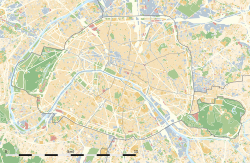Sorbonne University
| Université de Paris | |
 |
|
| Latin: Universitas magistrorum et scholarium Parisiensis | |
| Motto | Hic et ubique terrarum (Latin) |
|---|---|
|
Motto in English
|
Here and anywhere on Earth |
| Type |
Corporative circa 1150–1793, public 1896–1970 |
| Active |
circa 1150–1793, 1896–1970 |
| Location |
Paris, France 48°50′55″N 2°20′34″E / 48.84861°N 2.34278°ECoordinates: 48°50′55″N 2°20′34″E / 48.84861°N 2.34278°E |
| Campus | Urban |
| Nickname | The Sorbonne |
The University of Paris (French: Université de Paris), metonymically known as the Sorbonne (French: [sɔʁbɔn], its historical house), was a university in Paris, France. Emerging around 1150 as a corporation associated with the cathedral school of Notre Dame de Paris, it was considered as the second-oldest university in Europe. Officially chartered in 1200 by King Philip II (Philippe-Auguste) of France and recognised in 1215 by Pope Innocent III, it was often nicknamed after its theology collegiate institution, College of Sorbonne, founded about 1257 by Robert de Sorbon.
Internationally highly reputed for its academic performance in the humanities ever since the Middle Ages – notably in theology and philosophy – it introduced several academic standards and traditions that have endured ever since and spread internationally, such as doctoral degrees and student nations. Vast numbers of popes, royalties, scientists and intellectuals were educated at the University of Paris.
...
Wikipedia

